What can you do to protect water quality?
In addition to providing data to the state, Virginia Save Our Streams and our network of volunteer monitors encourage all citizens to do their part to clean up our waterways. You can make big strides toward water quality protection by making small changes in your everyday behavior. Here are some tips:
- Organize a stream clean-up event in your community.
- Landscape your home with native trees, shrubs, and flowers that do not need to be watered or fertilized.
- If you need to water your plants, use drip irrigation or soaker hoses. Better yet, capture rainwater from rooftops in rain barrels and use it to water plants.
- Don’t pour household chemicals such as paint or cleaners down drains, storm drains, or on the ground. Choose household cleaning products with low toxicity or pick a non-toxic alternative.
- Clean up after pets and dispose of their waste in the trash or toilet.
- Switch from using a garbage disposal to composting. Garbage disposals consume large amounts of water and add organic materials to sewage treatment systems.
- Test the soil in your yard to make sure you use the right amount of fertilizer. Excess fertilizer washes into streams when it rains, which may cause algae growth and reduced levels of dissolved oxygen.
- Take used motor oil to a recycling center or a gas station that recycles it. Oil poured down drains goes into streams, and oil thrown away in the trash may leach from sanitary landfills to contaminate ground water.
- Participate in local programs for hazardous household waste disposal.
- Inspect septic systems annually and pump them out every three to five years.
- Advocate for better federal laws to conserve waterways. Find out about all of the League’s current conservation initiatives, and how to contact your legislatures about current proposed policies.
- Advocate for better laws, policies, and management decisions in Virginia. Visit the public information page at the Department of Environmental Quality to find out about Public Notices, Public Calendar of Hearings, News Releases, and Citizen Boards.
